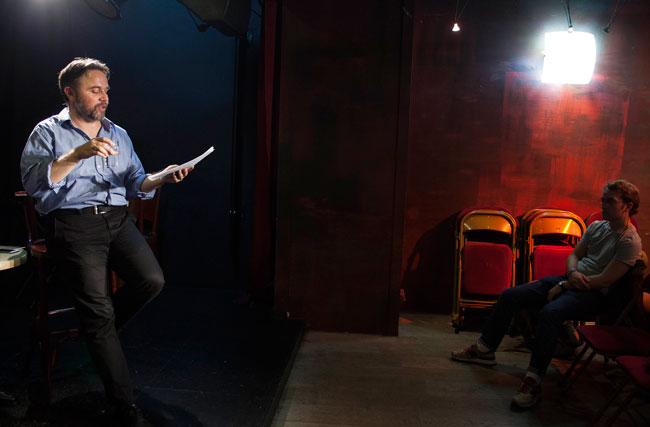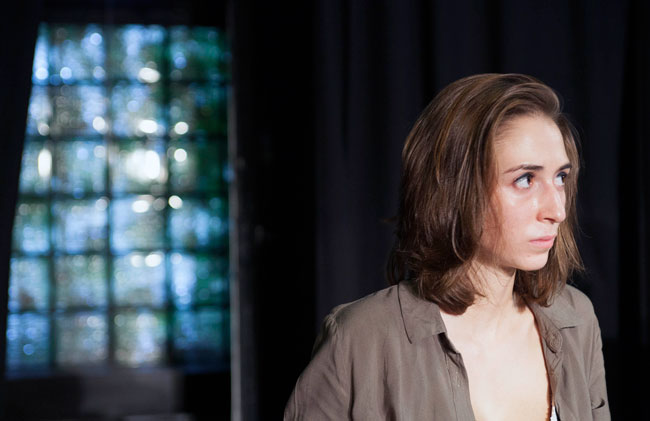
Rosary O’Neill is a renowned playwright for whom the year 2016 has been as exciting as her plays. A writer who uses the histories of real-life and long-dead people as muses, Rosary has traveled to Paris, France, to participate in a performance of Beckett at Greystones Bay (recently staged in Oregon Shakespeare Festival’s Midnight Series for which she has been asked to write a second act) and to develop a production of her play Degas in New Orleans for the Tricentennial of the founding of Louisiana by the French in 2017-2018.
In residence at the Irish Cultural Center in the Latin Quarter, Rosary is partnering with Brendan McCall – a theatre director/producer based in Norway to produce Beckett at Greystones Bay at the Theatre D’Ailleurs in Paris. From there, O’Neill and McCall hope to stage the work in several Parisian venues like the Irish Cultural Center and Columbia’s University’s Global outreach program at Reid Hall in Paris. Beckett at Greystones Bay entertains and educates and so the piece can aid theatre practitioners in their worldwide programs.
Rosary has greatly enjoyed working in Paris with Brendan McCall. “He’s another Irish American who first staged my Beckett play at the Arthur Seelen Theatre in NYC in 2007 and then staged Marilyn/God in Oslo. Norway,” Rosary explained. “We plan to set in motion a series on artist icons, what it took for them to excel, and the legacy they left behind!”
Rosary is also meeting with Annick Foucrier the head of the American Studies at the Sorbonne to coordinate a production in Paris of her other French-themed play Degas in New Orleans since the university — which holds one of the highest international reputations of academic institutions – is regaled for its high-quality literature programs and appreciates both the subject of Rosary’s plays and the effort that it takes to pen them. Rosary is planning the groundwork for her Degas production in 2017 the centennial of Degas’ death and the beginning of festivities for the Tricentennial of Louisiana’s founding by the French.
Other Rosary projects include: working with the American School in Paris to have a production of Beckett at Greystones Bay there in 2017, with the Sorbonne to have a reading of Degas in New Orleans at the Theatre Richelieu in February 2017, hosting a writing workshop for Sorbonne students in the Courtyard of the Irish Cultural Center in late September.
Born and raised in New Orleans, Rosary O’Neill is fluent in both French and English and revels in tales of artists who were somehow connected to Louisiana, Paris and Ireland – especially those who lived in times long passed. She relishes stories of artists who overcame much hardship and strove to keep creating work even when the odds were against them. “I want to use my work to heal global wounds between artists and countries,” Rosary stated. “Art and beauty can come from difficulty and grief; it’s remarkable how many artists sacrificed so much so they could keep working.”
Irish poet Samuel Beckett intrigues Rosary. Beckett had extreme difficulty getting published in Ireland–a reality that was doubly hard for him since his mother was completely unsupportive. After feeling shattered physically and emotionally, Beckett chose to admit himself into psychiatric therapy in London. “At only 26, his soul and his body were falling apart,” Rosary, explained. “He had boils, sties, chest pains, night sweats, breathing problems – all these physical conditions were interfaced with his failure as a writer and his contentious environment where no one but his deceased father believed in him.”
BrendanMcCall in BECKETT at Les Rendez-Vous D’ailleurs Theatre, Paris. Credit: Christian Raby.
Rosary’s extensive research left her amazed by how much Beckett doubted himself – and was doubted by others – given all the incredible laurels he won at a young age for his achievements as a professor at his alma mater Trinity College in Dublin. Beckett taught in Paris on a fellowship and even assisted famed author James Joyce. “He left academia to pursue writing and be true to his soul,” Rosary said. “He shows the reaches of great talent, to move beyond the ordinary and even quick success in the wrong realm. I am always aghast and mesmerized by the tortures that great talents confront to propel their work into the universe. It almost seems that the bigger the talent the more hurdles the artist has to overcome.”
Despite all the trials he faced, Beckett found happiness in Paris, France, which he adopted as his city. He subsequently wrote many works in French and was better received by audiences there than in his homeland. Rosary found this history to be very interesting; “Beckett is perhaps the greatest playwright of the 20th century. A humble man, he devoted his life to his talent and remained a true man of theatre, working in diverse languages and even writing in German and French to get published. When his work wasn’t accepted in Ireland or London, he moved on to Germany and then successfully to France. That takes a lot of dedication and guts.”
The first act of Rosary’s play about Beckett takes place on the beach on the day of his father’s death. The plot centers on young Beckett as he tries to decide whether to kill himself or claim his talent and go to London for therapy. Ultimately, he chooses to go to heal himself physically and spiritually and get strong so he can be a great writer. This act was presented as a short play and now, with the addition of act two, the work will be a full length. According to Rosary, “Act Two takes place in London where Beckett is undergoing therapy and coming to terms with his vicious mother and his violent thoughts and deciding what to do after the non-acceptance of his writing with English publishers.”
Along with exploring events about Beckett and Degas in Paris, Rosary is making connections with artistic institutions promoting culture including the American School in Paris, French Louisiana Association, Mona Bismarck Gallery, American Library, the Cultural Attache of the American Embassy, and the Fulbright Commission for American Exchange.
“The Irish Cultural Center has been very supportive,” Rosary stated. “It was, in fact, an Irishman who brought me to Paris. Oscar Wilde the subversive wit and playwright, like many Irish before him and since, fell in love with Paris. He was a fixture of the bohemian artistic circle, wrote his play Salome there, and after his fall from grace following his trial in 1895, he called Paris home.” Moreover, the Irish Cultural Center is situated in the heart of Paris at 5 Rue des Irlandais – a few blocks away from the Pantheon and within walking distance of the Sorbonne.
Rosary has her own strong ties to France. Her first play, Wishing Aces, garnered her a Fulbright Scholarship – the first of several – to Paris in 1992 and a French family housed her in their garret basement every summer for ten years so she could write there. “Other Parisians, colleagues and friends supported me through five more Fulbrights in Paris,” Rosary declared. “My friends who believe so much in me and my art inspire me to keep writing as does the beautiful city of Paris which has been lifting the souls of artists for centuries. I have had several plays staged in Paris by invitation of institutions’ there including Theatre de Nesle, American Center and Sorbonne University. The Fulbright Commission introduced me to so many artists who championed my work, translated it, and staged it. There is an unfathomable love for artists and playwrights in Paris. In 2014 I was in residence at the Cartoucherie Theatre writing my play about Marie LaVeau.
Nathalie Peltier in BECKETT at Les Rendez-Vous D’ailleurs Theatre, Paris. Credit: Christian Raby.
Akin to Beckett, Degas faced horrible struggles. Despite his status as a masterful artist today, Degas’ was initially considered a middling artist. “I want to uncover the soul behind their genius and reveal the legacy of their lives behind the art,” Rosary declared of both Degas and Beckett. “I find it fascinating that both had such strong ties to France, just like I do. Being of Irish descent and raised by an Irish grandmother in New Orleans, I felt I knew and had a connection to the family of Beckett. And Degas, well, his mother was from New Orleans and he still has thirty descendants there. I knew his world well having been raised in New Orleans and having lived there most of my adult life. I felt he too like Beckett was a traveler. Degas went to New Orleans to save his uncle’s cotton business and to reclaim his family there and witnessed and was part of the horror of Reconstruction. But triumph comes from pain.”
The reception of Beckett at Greystones Bay has been overwhelmingly positive among both French and Irish audiences. The big exhibition of Degas presently at the d’Orsay has resulted in great interest from the French Louisiana Association and the full support of the Attache Cultural of America to have the show performed for the Tricentennial of the founding of Louisiana.
“I met with enthusiastic folks at Reid Hall the global outreach center of Columbia University Paris,” Rosary explained. “Being a member of the Harlem Writers Project at Columbia in NYC furthered me in talking about Degas in Paris in 2017-2018 there. Beckett and Degas are European celebrities whereas in America they are historical men. Of course in NYC, with the many Degas paintings at the Metropolitan Museum of Art, Degas has heroic status, but in Paris when you talk of Beckett and Degas many people in the streets bow their head. That is mainly the reason why I passionately want to showcase my work here.”
Indeed, Rosary has many projects slated for the future and she intends for her work to promote international cooperation and world peace. She intends for Beckett at Greystones Bay to be staged in both Paris and Oslo before returning to the United Sates for runs in New York. Rosary says, “I feel audacious to be from the South and from NYC now and to dare to write about and hear the work I have written performed for Europeans. But Parisians and Irish here are so bright so compassionate so interested in the arts that I went to keep talking and writing. Playwriting enables us to celebrate these mighty men, these great heroes, these visionaries. We thank them for their suffering and my role, as playwright is to share the humor and the misery and the ultimate exhilaration they experienced out of being artists. There is great support for the arts in Paris and an amazing interest in culture. We artists here are moving forward by holding hands and marching in little steps to bigger and bigger projects. The audience is here in Europe for new and historical American plays.”
To keep up-to-date about Rosary’s latest projects, visit her website.

Newly Available for Licensing – October 2025 (US)

Newly Available for Licensing – October 2025 (UK)



